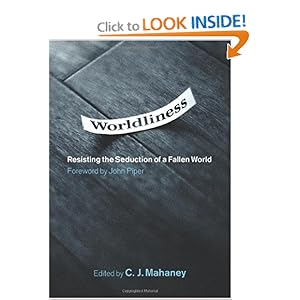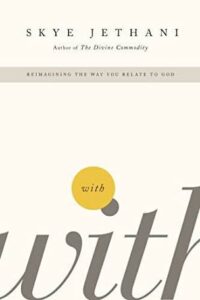 Takeaway: We should pay attention to sin and spend time thinking about whether we are focusing more on loving the world or loving God.
Takeaway: We should pay attention to sin and spend time thinking about whether we are focusing more on loving the world or loving God.
Purchase Links: Hardcover, Kindle Edition, christianaudio.com MP3 Audiobook
It is hard to review a book on worldliness. Not nearly as hard as writing one, but still hard. The tension is viewing worldliness as not anti-world, viewing holiness as a worthy goal, a desire to avoid legalism, the need to focus on the grace of Christ and the tendency to focus on a fairly narrow set of outward sins makes for a book on worldliness easy to take shots at.
I did not realized when I started this book that it was a series of essays by different authors rather than a complete work by Mahaney. And that makes a difference. What I liked so much about Mahaney’s book Humility (my review) was that it was so tightly pastoral. And that seems to be a bit missing in some of the essays. It also seems like it might be oriented toward young Christians. After all the chapters are about media, music, consumerism and how to dress right. (The chapter, my Mahaney, on dress really was inappropriate, it should not have been in the book and the focus seemed to be blaming women for being attractive. Guys can lust if a woman is in a Burka. The sin is the lust. The women are the victim of the sin, not the perpetrators. Yes, women can be immodest. Yes, that is a sin, but having a chapter about modesty without talking about the sin of lust means that you are picking on women without dealing with the root issue. After all if Adam and Eve were naked, without either shame or lust, then lack of clothing is not the issue. Unfortunately, the long section on immodest wedding dresses really crossed the line for me.)
Read more
 Takeaway: There is no other author quite like Matt Mikalatos
Takeaway: There is no other author quite like Matt Mikalatos Book Giveaway: See end of review for rules
Book Giveaway: See end of review for rules Takeaway: Christianity is about a relationship With God.
Takeaway: Christianity is about a relationship With God. Takeaway: A unique, and useful overview of what theology is about. More of introduction to the study of theology and Christian thought than introduction to theology itself.
Takeaway: A unique, and useful overview of what theology is about. More of introduction to the study of theology and Christian thought than introduction to theology itself. Takeaway: Not all of us are called to minister to male prostitues, but all of us are called to work out Micah 6:8 “And what does the LORD require of you? To act justly and to love mercy and to walk humbly with your God” for ourselves.
Takeaway: Not all of us are called to minister to male prostitues, but all of us are called to work out Micah 6:8 “And what does the LORD require of you? To act justly and to love mercy and to walk humbly with your God” for ourselves. Takeaway: Technology is shaped by its human creators, but also in turn shapes its human users. (This is the book I have been searching for on Technology and Christianity.)
Takeaway: Technology is shaped by its human creators, but also in turn shapes its human users. (This is the book I have been searching for on Technology and Christianity.) Takeaway: The Gospel is about proclaiming Christ as Lord over all, not primarily about personal salvation.
Takeaway: The Gospel is about proclaiming Christ as Lord over all, not primarily about personal salvation. Takeaway: A faith that can be fully understood by science or logic is no longer faith. As Christians we need to embrace that Christianity is above human logic.
Takeaway: A faith that can be fully understood by science or logic is no longer faith. As Christians we need to embrace that Christianity is above human logic. Takeaway: We should pay attention to sin and spend time thinking about whether we are focusing more on loving the world or loving God.
Takeaway: We should pay attention to sin and spend time thinking about whether we are focusing more on loving the world or loving God.